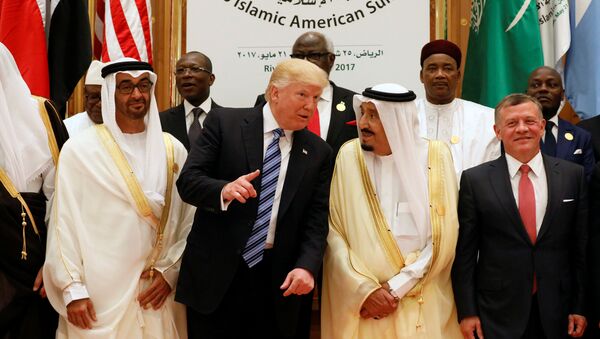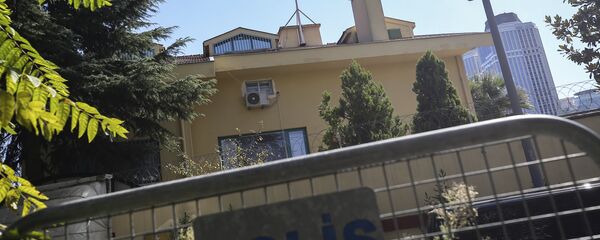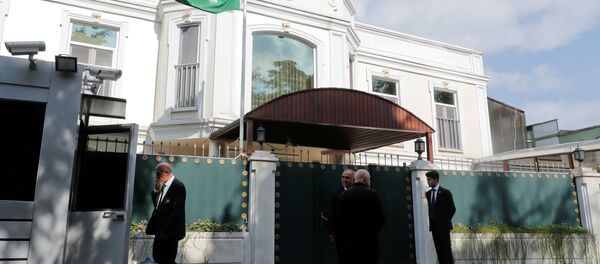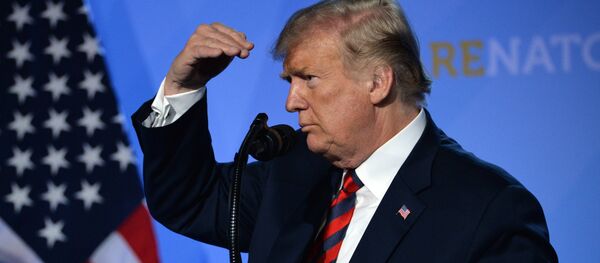US President Donald Trump is likely to capitalize on the Khashoggi case, but he will neither impose sanctions on the Kingdom of Saudi Arabia, nor mar relations with Riyadh, Naim Baburoglu, a retired Turkish general, military strategist and academic at Istanbul Aydin University (IAU), told Sputnik Turkey.
"The United States will never impose sanctions that could seriously harm Saudi Arabia and destroy relations with it," the retired general emphasized. "They will only continue to use sanctions rhetoric as a tool for pushing their interests."
Saudi journalist Jamal Khashoggi, a Washington Post columnist, went missing on October 2 after visiting the Saudi Consulate in Istanbul. While the Turkish police suspects Riyadh of sending a "hit squad" to kill the columnist, the KSA government has vehemently denied the accusations. Apart from media speculations about the alleged murder no credible evidence to back the claims has emerged so far. The kingdom provided Turkish authorities with access to its consulate and launched a joint investigation into the journalist's disappearance.
"Now Trump is looking only in one direction in this situation, namely in the direction called 'the dollar, income from the arms trade and how to make the most of it'," Baburoglu opined. "With this in mind, it is clear that it does not matter to Trump who killed whom in this incident, whether the murder was actually committed in the building of the Saudi Consulate in Istanbul. For Trump it is much more important how he can use this situation to increase the volume of arms sales to Saudi Arabia."
According to Baburoglu, Trump is pursuing three major goals, namely, to force Riyadh to increase oil output amid the Iran oil embargo that is due to come into force on November 4; to exert further pressure on the Islamic Republic of Iran (IRI); to increase weapons sales to the KSA.
"The new package of anti-Iran sanctions, which will come into force on November 4, is of great importance," the military strategist noted. "Under the conditions imposed on the Iranian oil trade by the US, it is necessary that Iran's exports are covered by another country, since it is necessary to avoid the global oil crisis and the hike in cost of oil. In this regard, the United States demanded that Saudi Arabia boost crude production to approximately 2 million barrels per day."
Meanwhile, the US is seeking to ensure Israel's security and potentially carry out an operation against Iran, the academic suggested, adding that Washington had already formed an "anti-Iran coalition" that will be led by Saudi Arabia and the United Arab Emirates (UAE).
"Now Trump will use the Khashoggi incident as a tool for heightening tension around and inside Iran by imposing additional tough economic sanctions, or conducting an air operation against Iran," the retired general presumed.
As for Saudi Arabian arms purchases, in 2017 the Stockholm International Peace Research Institute ranked the kingdom third in the list, with a $69.4 billion military budget.
"Over the past 5 years [Saudi Arabia] has increased arms imports by 225 percent," the academic stressed. "The United States will never give up such a tasty morsel as the Saudi market, neither because of Khashoggi, nor because of any other reason. And even if the American authorities wanted to do so, they would not be allowed by the global arms manufacturers in the US."
According to the retired general, the US-Saudi relationship will continue to thrive: Given all of the above, the imposition of sanctions against the KSA does not correspond to Washington's interests.
The views and opinions expressed by the speaker do not necessarily reflect those of Sputnik.





